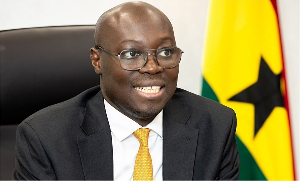The trial in absentia of the embattled former CEO of MASLOC, Sedina Christine Tamakloe Attionu, that led to the imposition on her of a jail term of ten years, has engendered thought-provoking questions in criminal law. The critical questions raised by this case include the following:
What is the constitutionality of trial in absentia under our present constitutional arrangement? What is the effect of the sentence of imprisonment imposed on the absconding offender? When does a sentence of imprisonment imposed on an absconding offender take effect? What happens when an absconding offender fails to appear to serve his sentence?
Can the sentence of imprisonment be suspended until such time that the absconding offender is re-arrested or voluntarily submits himself? Any attempt to find answers to these questions reveals fundamental inadequacies in the criminal law of Ghana. This article is my contribution to the discourse.
Constitutional basis of trial in absentia
The bundle of constitutional rights enjoyed by an accused person includes the right to be present throughout the trial. In criminal trials, our law encourages face-to-face encounters between the accused and the accuser. The right of the accused to be present at the trial is not a mere common law principle. It is a procedural right enshrined in the 1992 Constitution.
Article 19(3) of the Constitution mandatorily enacts that the trial of a person charged with a criminal offence shall take place in his presence. However, despite the practical importance of this constitutional right, it is not absolute; it is subject to exceptions. Thus, the right of an accused to be present at his trial may be voluntarily waived or dispensed with under certain circumstances.
Under Article 19(3) of the 1992 Constitution, the court has the power to try an accused person in his absence under two main circumstances. First, the trial of the accused may take place in his absence if he refuses to appear before the court for the trial to be conducted in his presence after he has been duly notified of the trial.
Thus, when the accused person absconds after he has been granted bail and fails to re-appear to stand trial, the court may decide to try him in absentia. In the case of Bonsu alias Benjillo v The Republic [1999-2000] 1 GLR 199, the Supreme Court made it clear that an absconding accused person can legitimately be tried in absentia if he fails to attend court after he has had notice of the trial.
Second, the trial of an accused person may proceed in his absence if he conducts himself in such a manner as to render the continuation of the proceedings in his presence impracticable. Thus, an accused person may be removed from the courtroom during the trial if his conduct is so disruptive that the trial cannot proceed in an orderly manner in his presence.
The personal attendance of an accused person may also be dispensed with under section 256 of the Criminal and Other Offences (Procedure) Act, 1960 (Act 30) on grounds of illness where such step will not entail any prejudice to the accused; and under section 70 of Act 30 where the accused pleads guilty in writing or appears by his lawyer and the court dispenses with his appearance. Trial in absentia is permissible under our law.
When does a sentence of imprisonment take effect?
Now, it is well settled that our law permits trial in absentia in certain situations. The next important question is this: When does a sentence of imprisonment begin to run? It is a cardinal principle of our law that a sentence or criminal punishment should not be retrospective. What this means is that a sentence takes effect from the date it is pronounced or imposed. Thus, section 315(2) of Act 30 provides:
“A sentence of imprisonment shall commence on and include the whole of the day on which it is pronounced.” A judge cannot pronounce a sentence and indicate that it should take effect from a previous date or subsequent date. Thus, a sentence can neither be backdated nor postdated. In Ojo and Another v. The Republic [1999-2000] 1 GLR 169, the Court of Appeal made it clear that section 315(2) of Act 30 does not entitle a court to backdate a sentence.
According to the Court of Appeal, a judge could not impose a sentence of imprisonment today and say it should take effect from yesterday. Also, the combined effect of the cases of Kwame Awuah v. Republic [2018] 127 G.M.J 240 and Republic v. Uyanwune [2013] 58 G.M.J. CA 162 and Charles Ansah v. Republic [2017] 111 G.M.J 193 C.A. is that in criminal law, a judge does not have jurisdiction to impose a sentence to take retrospective effect from the date of arrest and detention or any other date other than the date the sentence is imposed.
Practical implications of a sentence imposed in absentia
What is the implication of the law on a sentence imposed on an absconding offender? What happens to the sentence if the absconding offender fails to appear to serve it? Since a sentence takes effect from the date it is imposed, a sentence imposed on an absconding offender may elapse if he fails to appear to serve the sentence and nothing can be done to the offender.
Under Ghanaian law, a sentence cannot be suspended to be served on a future date. Suspended sentences apply in Ghana under very limited circumstances. There are only two instances in which a sentence of imprisonment may be suspended. First, section 313A of Act 30 empowers a court to suspend a sentence of imprisonment imposed on a pregnant female offender.
Second, section 318 of Act 30 permits the court to suspend the execution of a sentence of imprisonment imposed in default of payment of a fine. Apart from these limited circumstances, there is no place for suspended sentences in our law. This is a worrying inadequacy in our criminal justice system.
Now, what is the implication of the law on the ten-year sentence imposed on the former CEO of MASLOC in absentia? By the judgment of the Accra High Court, Sedina Christine Tamakloe Attionu is to serve a jail term of ten years. By law, the jail term took effect from the date of the judgment, i.e. 16th April 2024. The sentence cannot be suspended to await her extradition to Ghana.
If Sedina Christine Tamakloe Attionu can escape for the next ten years, her sentence will elapse and she cannot be punished again to serve another jail term for the same offense. Again, even though she may be extradited to serve her punishment, she would only be liable to serve the remainder of the sentence at the time of her extradition.
Thus, if she is extradited or she voluntarily submits herself to the authorities after five years, she would only serve the remaining five years. This is a stark absurdity and weakness in our present sentencing regime.
Conclusion
It is clear that the present sentencing regime in Ghana has a serious lacuna and needs immediate reforms. An offender who is tried in absentia may escape justice if he fails to appear to serve his sentence. The law does not provide for suspended sentences.
This makes trial in absentia unnecessary and imprudent in the first place. Why impose a sentence on an absconding offender when you have no power to suspend the sentence to be served in the future? This weakness in the law is an incentive for offenders to choose trial in absentia. Indeed, the imposition of a sentence in absentia may be a judicial exercise in futility if the offender fails to submit himself or is not re-arrested.
This reality must spark concern for reforms to be made in our sentencing laws in Ghana. It is high time we considered the introduction of suspended sentences, the parole system, and community service as sentencing alternatives in our law. I submit that a Sentencing Act should be enacted to provide a broad legal and more effective regime for criminal punishment in Ghana.
The sentencing options in our present law are not only limited, they are also archaic and do not produce outcomes consistent with modern notions of fundamental justice.
Opinions of Monday, 22 April 2024
Columnist: Daniel Korang















